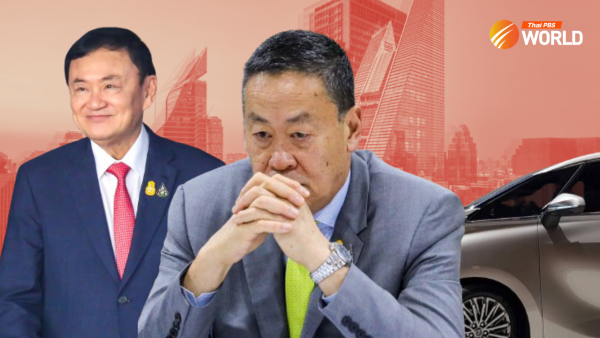Democrat leadership choice – a field wide open

There’s something ironic about Warong Dechgitvigrom, but his emergence as one of the candidates to challenge Abhisit Vejjajiva for the leadership of the Democrat Party is probably one of the most intriguing political developments over the past few days.
Pheu Thai is not the only party that can pull a leadership candidate out of nowhere. Latest developments in the Democrat Party show that Thailand’s oldest political camp can do it as well. The name of Warong has raised a few eyebrows, including those of Democrats themselves.
Warong, Jurin Laksanavisit and Korn Chatikavanij top the list of those tipped to challenge Abhisit. While the mentioning of Jurin and Korn is predictable, Warong’s is not. Despite his substantial role in the Democrat Party’s probe of the Pheu Thai government’s rice pledging controversy, Warong is not very well-known politically, let alone among the general public. More than that, Warong used to work for Thaksin, and left the latter’s party just because the former hospital executive was not selected as an election candidate.
Political watchers can understand why Warong has been thrusted into the limelight today. First and foremost, the Democrats have a praiseworthy tradition of being democratic when it comes to electing new leaders. Groups within the party can promote their candidates, and their showdowns leading to the eventual selection of the one to take the helm are to different degrees more open than those of other parties.
It can be said that Thanat Khoman, Chuan Leekpai, Bhichai Rattakul, Banyat Bantadtan and Abhisit came from totally different backgrounds and their leadership of the Democrat Party, no matter how peaceful or turbulent, is genuine.
Warong, Jurin and Abhisit are supported by party key men, a situation not unfamiliar in the Democrat Party.
Incumbent Abhisit remains the strongest favourite for the top post, not least because he is supported by Chuan, who is still adored by the public and enjoys admiration within the party. Jurin is reportedly backed by Banyat. Warong’s back-up, however, may be the most interesting of all.
Backing aside, Jurin, Korn and Warong can be candidates that can send a serious political message.
Abhisit’s involvement in the political crisis over the past few years is a weak spot in his resume. If he somehow steps aside, Pheu Thai will be forced to seek a leader that is less confrontational. Considering this complication, Abhisit remaining the Democrat leader can make life easier for Pheu Thai, which is known to be looking to handpick a leader as close to the Shinawatras as possible.
Warong is probably the most controversial among the challengers of Abhisit. He used to be with Thaksin Shinawatra’s Thai Rak Thai Party to begin with. He left Thai Rak Thai in 2004 after being snubbed in a selection of election candidates. He was elected as a Phitsanulok MP under the Democrat banner in the following year.
Warong’s role in the Democrat Party’s investigation into the rice scheme controversy can make him a very awkward competitor against Pheu Thai if he receives the highest Democrat profile. Pheu Thai, accusing him of leading the probe out of grudge, can make the election fight a “him or us” campaign to absolve its government, whose reputation was smeared by alleged corruption in the rice programme.
Warong gave up obstetric study, practices, as well as senior local hospital post and joined Thai Rak Thai when Thaksin was scaling his political peak. Disappointment at being passed over at the 2004 election candidate selection drove him toward the Democrat Party and became MP for the first time in 2005 as a representative of Phitsanulok Province. After that, he won two more elections in a row and been increasingly active with a growing status in the Democrat Party.
But the Thaksin connection is probably less contentious than an emerging perception that he could be part of a plot to support military-backed Prayut Chan-o-cha’s stay in power beyond next year’s election. Political analysts see connections between Warong and Suthep Thaugsuban, a former Democrat heavyweight who left the party to launch a massive street campaign against the Pheu Thai government a few years ago. Outspoken politician Tavorn Sennium is said to be among those backing Warong’s candidacy.
Tavorn can be linked to Suthep, who is known to support Prayut’s continuation as the country’s chief executive, something Abhisit is reluctant to do to say the least. And nobody disputes Suthep’s lingering influence in the party even though he is no longer officially affiliated with it in any way.
Simply put, a lot of people think that making the Democrats support Prayut through Warong is easier than through Abhisit. Even a former Democrat MP Watchara Petthong is questioning Warong’s emergence as a leadership candidate, describing him as being propped up by external influences to get Abhisit out of Prayut’s way.
Jurin or Korn can be “less controversial” in several aspects. Both are well-accepted among party members, less confrontational as far as Pheu Thai is concerned, and have positive images among the public.
And out of nowhere came Alongkorn Pollabutr, a former deputy leader of the party, who declared last week he was throwing his hat into the ring to challenge Abhisit’s leadership. Alongkorn left the party in 2014 to join the junta-appointed national reform council. But as an “outsider” – he is no longer even a party member – he certainly has a long road ahead but that doesn’t mean that he cannot make waves.
Because of his influence and widespread support in the party, Abhisit still holds an upper hand over his potential contenders. But the fight for leadership will definitely be an exciting and closely watched event – not least because it will take place in a field that is more open than ever before. – By ThaiPBS World’s Political Desk






